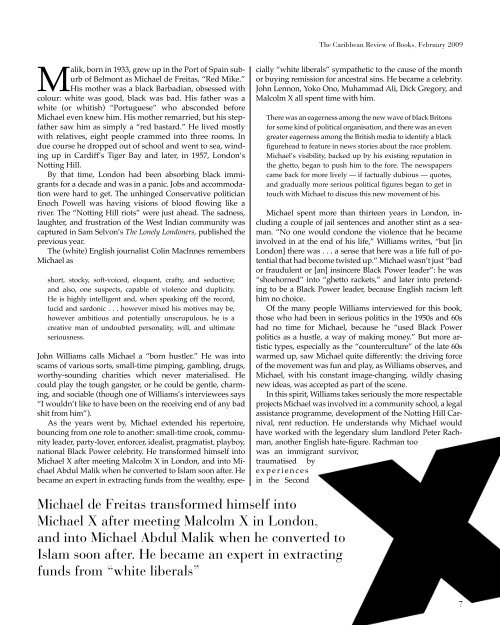The Caribbean Review of Books (New vol. 1, no. 19, February 2009)
A sample of the new CRB, as published by MEP until 2009
A sample of the new CRB, as published by MEP until 2009
Create successful ePaper yourself
Turn your PDF publications into a flip-book with our unique Google optimized e-Paper software.
<strong>The</strong> <strong>Caribbean</strong> <strong>Review</strong> <strong>of</strong> <strong>Books</strong>, <strong>February</strong> <strong>2009</strong><br />
Malik, born in <strong>19</strong>33, grew up in the Port <strong>of</strong> Spain suburb<br />
<strong>of</strong> Belmont as Michael de Freitas, “Red Mike.”<br />
His mother was a black Barbadian, obsessed with<br />
colour: white was good, black was bad. His father was a<br />
white (or whitish) “Portuguese” who absconded before<br />
Michael even knew him. His mother remarried, but his stepfather<br />
saw him as simply a “red bastard.” He lived mostly<br />
with relatives, eight people crammed into three rooms. In<br />
due course he dropped out <strong>of</strong> school and went to sea, winding<br />
up in Cardiff’s Tiger Bay and later, in <strong>19</strong>57, London’s<br />
Notting Hill.<br />
By that time, London had been absorbing black immigrants<br />
for a decade and was in a panic. Jobs and accommodation<br />
were hard to get. <strong>The</strong> unhinged Conservative politician<br />
E<strong>no</strong>ch Powell was having visions <strong>of</strong> blood flowing like a<br />
river. <strong>The</strong> “Notting Hill riots” were just ahead. <strong>The</strong> sadness,<br />
laughter, and frustration <strong>of</strong> the West Indian community was<br />
captured in Sam Selvon’s <strong>The</strong> Lonely Londoners, published the<br />
previous year.<br />
<strong>The</strong> (white) English journalist Colin MacInnes remembers<br />
Michael as<br />
short, stocky, s<strong>of</strong>t-voiced, eloquent, crafty, and seductive;<br />
and also, one suspects, capable <strong>of</strong> violence and duplicity.<br />
He is highly intelligent and, when speaking <strong>of</strong>f the record,<br />
lucid and sardonic . . . however mixed his motives may be,<br />
however ambitious and potentially unscrupulous, he is a<br />
creative man <strong>of</strong> undoubted personality, will, and ultimate<br />
seriousness.<br />
John Williams calls Michael a “born hustler.” He was into<br />
scams <strong>of</strong> various sorts, small-time pimping, gambling, drugs,<br />
worthy-sounding charities which never materialised. He<br />
could play the tough gangster, or he could be gentle, charming,<br />
and sociable (though one <strong>of</strong> Williams’s interviewees says<br />
“I wouldn’t like to have been on the receiving end <strong>of</strong> any bad<br />
shit from him”).<br />
As the years went by, Michael extended his repertoire,<br />
bouncing from one role to a<strong>no</strong>ther: small-time crook, community<br />
leader, party-lover, enforcer, idealist, pragmatist, playboy,<br />
national Black Power celebrity. He transformed himself into<br />
Michael X after meeting Malcolm X in London, and into Michael<br />
Abdul Malik when he converted to Islam soon after. He<br />
became an expert in extracting funds from the wealthy, especially<br />
“white liberals” sympathetic to the cause <strong>of</strong> the month<br />
or buying remission for ancestral sins. He became a celebrity.<br />
John Len<strong>no</strong>n, Yoko O<strong>no</strong>, Muhammad Ali, Dick Gregory, and<br />
Malcolm X all spent time with him.<br />
<strong>The</strong>re was an eagerness among the new wave <strong>of</strong> black Britons<br />
for some kind <strong>of</strong> political organisation, and there was an even<br />
greater eagerness among the British media to identify a black<br />
figurehead to feature in news stories about the race problem.<br />
Michael’s visibility, backed up by his existing reputation in<br />
the ghetto, began to push him to the fore. <strong>The</strong> newspapers<br />
came back for more lively — if factually dubious — quotes,<br />
and gradually more serious political figures began to get in<br />
touch with Michael to discuss this new movement <strong>of</strong> his.<br />
Michael spent more than thirteen years in London, including<br />
a couple <strong>of</strong> jail sentences and a<strong>no</strong>ther stint as a seaman.<br />
“No one would condone the violence that he became<br />
in<strong>vol</strong>ved in at the end <strong>of</strong> his life,” Williams writes, “but [in<br />
London] there was . . . a sense that here was a life full <strong>of</strong> potential<br />
that had become twisted up.” Michael wasn’t just “bad<br />
or fraudulent or [an] insincere Black Power leader”: he was<br />
“shoehorned” into “ghetto rackets,” and later into pretending<br />
to be a Black Power leader, because English racism left<br />
him <strong>no</strong> choice.<br />
Of the many people Williams interviewed for this book,<br />
those who had been in serious politics in the <strong>19</strong>50s and 60s<br />
had <strong>no</strong> time for Michael, because he “used Black Power<br />
politics as a hustle, a way <strong>of</strong> making money.” But more artistic<br />
types, especially as the “counterculture” <strong>of</strong> the late 60s<br />
warmed up, saw Michael quite differently: the driving force<br />
<strong>of</strong> the movement was fun and play, as Williams observes, and<br />
Michael, with his constant image-changing, wildly chasing<br />
new ideas, was accepted as part <strong>of</strong> the scene.<br />
In this spirit, Williams takes seriously the more respectable<br />
projects Michael was in<strong>vol</strong>ved in: a community school, a legal<br />
assistance programme, development <strong>of</strong> the Notting Hill Carnival,<br />
rent reduction. He understands why Michael would<br />
have worked with the legendary slum landlord Peter Rachman,<br />
a<strong>no</strong>ther English hate-figure. Rachman too<br />
was an immigrant survivor,<br />
traumatised by<br />
experiences<br />
in the Second<br />
Michael de Freitas transformed himself into<br />
Michael X after meeting Malcolm X in London,<br />
and into Michael Abdul Malik when he converted to<br />
Islam soon after. He became an expert in extracting<br />
funds from “white liberals”<br />
7


















